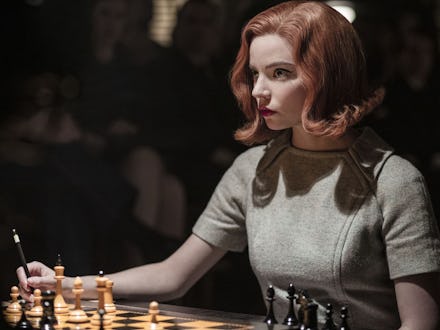'The Queen’s Gambit' depicts a masculinity-driven chess girl fantasy

By now, Netflix has proven that it is more than happy to produce female and queer-lead shows to raise its profile. How much it follows through with its excitement is another story. Think Glow, The Society, or I’m Not Ok With This, all cancelled unceremoniously by the streaming giant. With its adaptation of The Queen’s Gambit, Netflix has found a way to imbue the same lukewarm façade of progress into its content.
Based on the book of the same name by Walter Tevis, The Queen’s Gambit follows Beth Harmon (played by Anya Taylor-Joy), an orphaned chess prodigy in 1960’s Kentucky, as she climbs the ranks to become world champion. She is fierce and headstrong, fending for herself in a male-dominated world while also fighting the demon of addiction. And while the show is very much a thrilling watch, its story of empowerment and resilience is almost too contrived to bear.
Many viewers may find themselves Googling the name Beth Harmon after finishing the show in order to read about anyone who might have inspired her character. Someone who pioneered female representation in top chess tournaments in the ‘60s. It’s too bad there is no such person.
That's likely because chess is still an extremely segregated sport. If Beth Harmon were alive and playing chess in the 1960s, she would not have been competing amongst men. Instead, she would have likely taken part in the Women’s Championship, which many other prodigy players had been dominating since 1927. And she would have done the same had she be coming up in the world of chess in 2020. While the World Chess Championship cycle is open to both men and women, only men have reached the finals.
Beth is but a shadow of what a woman in chess might look like, as dreamt up by men. She can keep up with the boys and challenge the status quo but doesn’t pose a threat, neither sexually nor to their position. Outside of her play, she is docile and fragile. She has got too much on her hands to incite a revolution and organize other women to fight for their rightful spot in the game. While we see her being underestimated and pigeon-holed because of her womanhood, she doesn’t do much when it comes to addressing the misogyny of the world that encompasses her entire life. A world which, almost 60 years on, remains less diverse than this fictional take gives it credit for.
When asked how it feels to be a woman amongst all those men — albeit a maliciously posed question — Beth is mostly concerned with preserving the legitimacy of her position, saying she doesn’t mind it, rather than address her position as a woman in that world. And again, after being accused of being too glamorous to be a serious chess player, her response is one of aggressive deflection (“It’s much easier to play chess without the burden of an Adam’s apple.”) rather than meaningful confrontation.
During her first tournament, when she's paired with the only other girl in competition, Beth is satisfied with the knowledge that she alone will have the chance to progress and compete against the men because of her talent. Years later, when the same girl comes to a tournament to thank her for showing women that it was possible for them to compete in top chess tournaments, her character doesn’t seem to even engage with the sentiment, as if it never occurred to her that her success represented a meaningful accomplishment for anyone but herself.
In real life, the highest ever ranking female chess champion, Judit Polgár was, at the peak of her career, the eighth ranked player in the world. At age 15, she became the youngest ever grandmaster, breaking the record previously set by Bobby Fischer. Still, in a piece that caught the mainstream media attention in 2015, Nigel Short, one of the UK’s greatest chess players, claimed that men were “hardwired” to be better at the game than women. “The average gap is pretty large and that is down to sex differences … Those differences exist.” Rather than fretting about inequality, he followed, “perhaps we should just gracefully accept it as a fact.” The fact Polgár had once beaten him was irrelevant to his general point, he added.
The Queen’s Gambit is a breezy and vaguely empowering tale of a young woman beating the odds due to sheer brilliance and gumption. Obliquely, it does a good job at explaining why it's so difficult for women to advance in most fields.
Ultimately, The Queen's Gambit is about a talented woman who just sat still and played the game, never bothering to make anyone feel too uncomfortable.